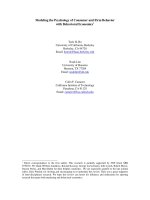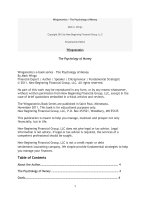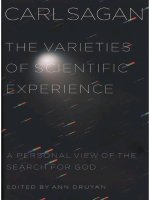Carl gustav jung psychology of the unconscious (1949)
Bạn đang xem bản rút gọn của tài liệu. Xem và tải ngay bản đầy đủ của tài liệu tại đây (14.38 MB, 636 trang )
Keep Your Card in This Pocket
Books vrtll be Issued only on presentation
of
proper
library cards,
Unless labeled otherwise, books may be retained
two weeks. Borrowers finding books marked, dofaced or mutilated are expected to report same at
library desk; otherwise the last borrower will be, held
isaponstble for nil imperfections discovered.
The card holder Is responsible for all books drawn
tor
on
oard.
Penalty for over-due books 2o a day plus cost of
this
notices.
Lost cards and change of residence must be reported promptly,
Public Library
Kansas City, Mo.
PSYCHOLOGY OF THE UNCONSCIOUS
PSYCHOLOGY OP
THE UNCONSCIOUS
A Study of the Transformations
and Symbolisms of the Libido
A
Contribution
to the
History of the Evolution of Thought
DR, C. G.
Of
JUNG
the University of Zurich
AUTHORIZED TRANSLATION, WITH INTRODUCTION, BY
BEATRICE M. HINKLE, M.D
NEW YORK
DODD,
MEAD AND COMPANY
1949
OOPTRIOHT, 1910
V
DODD, MEAD AND COMPANY,
INC
TRANSLATOR'S NOTE
THAT
is
humanity
seeking a new message, a
new
light
upon the meaning of life, and something tangible, as it
were, with which it can work towaids a larger understanding of itself and its relation to the universe, is a
fact
I
seemed
none
think
to
me
will
gainsay
Therefore,
lish-speaking world Dr. Jung's remarkable book,
lungen und Symbole der Libido."
In this
has
it
particularly timely to introduce to the
"
work
Eng-
Wandhe has
plunged boldly into the treacherous sea of mythology and
folklore, the productions of the ancient
the
common
the
same
people, and turned
scientific
analysis that
is
that of
and painstaking method of psychologic
unites all humanity,
to exist
mind and
this vast material
applied to the modern mind,
common bond
reveal the
upon
in
order
to
of desire and longing which
and thus bridge the gaps presumed
between ancient and widely separated peoples and
those of our
modern
time.
The
discoveiy of this under-
current affecting and influencing ancient peoples as well
as
modern
serves as a foundation or platform
from which
new goal
of
attainment possible of achievement and which can be
in-
he proceeds
to
hold aloft a new
ideal,
a
as emotionally appealing:
tellectually satisfy ng, as well
;
the goal of
moral autonomy.
This book, remarkable for
mendous labor expended upon
BINDERY MAR 1 2
its
erudition and the
tre-
it,
as well as for the
new
TRANSLATOR'S NOTE
vi
which
sheds upon
human
life, its motives, its
not one for desultory readSuch an approach will
ing or superficial examination
prevent the reader from gaining anything of its real
light
needs and
it
its possibilities, is
value, but for those
who
can bring a serious interest and
willingness to give a careful study to
it
the
work
will
prove to be a veritable mine capable of yielding the
greatest riches.
The
difficulties in
translating a
book such as
this are
almost insuperable, but I have tried faithfully to express
Dr. Jung's thought, keeping as close to the original text
as possible and, at the
same
material and complicated
clearly as
work
I
(.he
subject-matter
owe much
to
time, rendeiing the difficult
German phrasing
as
would allow
Miss Helen
I.
simply and
In all this
Brayton, without
work would never have been
I wish to acknowledge my gratitude to Mr.
completed
Louis Untermeyer, whose help in rendering the poetic
whose
faithful assistance the
quotations into English verse has been invaluable, and to
my gratitude to other friends
various ways from time to time.
express as well
assisted
me
in
B.
who have
M. H.
AN INTRODUCTION TO PSYCHOANALYSIS
AND ANALYTIC PSYCHOLOGY
WHEN
made
Professor Freud of Vienna
his
early
discoveiies in the realm of the neuroses, and announced
that
the
basis
and origin of
various
the
symptoms
grouped under the terms hysteria and neuroses lay in
and wishes, unexpressed and unknown
unfulfilled desires
most
to the patient for the
with the jsexual
instinct,
reaching influence
this
it
part,
and concerned
chiefly
was not realized what
far-
unpopular and bitterly attacked
theory would exert on the understanding of
human
life
in general.
For
this
theoiy has so widened in
application has
now extended beyond
of pathologic states.
tion of the
its
scope that its
a particular
It has in fact led to a
whole conduct of human
life;
a
group
new evaluanew compre-
hension has developed which explains those things which
formerly were unexplained,
and there
is
offered
an
understanding not only of the symptoms of a neurosis
and the phenomena of conduct but the product of the
mind
as expressed in myths and religions.
This amazing growth has proceeded steadily
in
an
ever-widening fashion despite opposition as violent as
any of which we have knowledge
in the past.
cism originally directed towards the
little
The
criti-
understood and
INTRODUCTION
vih
much
disliked sexual conception
now
includes the further
teachings of a psychology which by the application to
it
of such damning phrases as mystical, metaphysical and
sacrilegious,
To add
is
condemned
as unscientific.
to the general confusion
surrounding
this
new
and misundertanding
school of thought there has arisen
amongst the leaders themselves, so that there
two schools led respectively by Professor
Sigmund Freud of Vienna and Dr Carl Jung of Zurich,
referred to in the literature as the Vienna School and
a division
now
exist
the Zurich School
It
is
very easy to understand that criticism and opposi-
psychology so difficult of
comprehension, and so disturbing to the ideas which have
been held by humanity for ages; a psychology which
furthermore requires a special technique as well as an
tion should develop against a
observer trained to recognize and appreciate in psychologic phenomena a verification of the statement that
there is no such thing as chance, and that every act and
every expression has its own meaning, determined by the
inner feelings and wishes of the individual.
It is
not a simple matter to come out boldly and state
is to a large extent the determiner
that every individual
own destiny, for only by poets and philosophers
has this idea been put forth not by science and it is a
of his
;
brave act to make
of
all its
scientific
this
statement with
full
consciousness
meaning, and to stand ready to prove
it
by
reasoning and procedure
Developed entirely through empirical investigation and
through an analysis of individual cases, Freudian psy-
INTRODUCTION
ix
chology seems particularly to belong to that conception
"
An empirical acquaintance with
of Max Mullet's that
facts rises to a scientific
knowledge of
mind discovers beneath
the
the
facts as
multiplicity
*
productions the unity of an organic system."
I
name given to the method
reaching down into the hidden depths of
Psychoanalysis
veloped for
soon as
of single
the
is
de-
the
individual to bring to light the underlying motives and
determinants of his symptoms and attitudes, and to reveal
lie behind actions and
the unconscious tendencies 'which
reactions and which influence development and determine
the relations of
life itself.
/The
result of digging
into the hidden psyche has been to produce a
down
mass of
mateiial from below the threshold of consciousness, so
astonishing and disturbing and out of relation with the
pieviously held values, as to arouse in any one unfamiliar
with the process the strongest antagonism and criticism.
Although originally studied only as a therapeutic
for the sick it was soon realized through an
method
analysis of
normal people how
in the content
normal
The
slight
were the differences
of the unconscious of the sick and of the
differences observed
in the reactions to life
and to the
were seen
conflicts
to
be rather
produced by
contending forces in the individual.
These conflicts, usually not fully perceived by the individual, and having to do with objectionable desires and
wishes that are not
self,
in
in
produce marked
certain
opinions,
*"
keeping with the conscious idea of
effects which are expressed either
prejudices,
attitudes
Science of Language," first series, p
25,
of
conduct,
INTRODUCTION
x
some
faulty actions, or in
As Dr Jung
says, he
definite pathologic
who remains Jiealthy
symptom.
has to struggle
with the same complexes that cause the neurotic to fall
In a valuable
by the
late
book
Professor
N
ill.
"
The Neighbor," written
Shaler of Harvard University,
called
very far-reaching statement: "jit is
hardly too much to say that all the important errors of
conduct, all the burdens of men or of societies are caused
occurs
there
this
in the association of the primal animal
emotions with those mental powers which have been so
by the inadequacies
rapidly developed in mankind."
This statement, reached by a process of reasoning
and a method of thought and study entirely different
from psychoanalysis, nevertheless so completely ex-
form the very basis of the postulates
developed through psychoanalysis that I quote it here
Such a statement made in the course of a general examination of human relations does not arouse opposition nor
presses in brief
seem
to be so difficult of acceptance.
It
appears to be
the individual application of these conceptions that has
roused
such
bitter
antagonism
and
violent
denuncia-
tions.
Rightly understood and used, psychoanalysis
may
be
m
the
compared to surgery, for psychoanalysis stands
same relation to the personality as surgery does
to the
body, and they aim at parallel results.
It is well recognized that in the last
analysis nature is
the real physician, the healer of wounds but prior to the
;
development of our modern asepsis and surgical technique
the healing produced by nature was most often of a
very
INTRODUCTION
faulty
and imperfect type
xi
hideous scars, distorted and
crippled limbs, with functions impaired or incapacitated,
from the wounds, or else nature was unable to
resulted
cope with the hurt and the injured one succumbed
\ Science has been steadily working for centuries with
the aim of understanding nature and finding
means
to
aid and co-operate with her so that healing could take
place with the least possible loss of function or permanent
mjuiy to the
warded these
individual.
Marvelous
have
results
re-
persistent efforts, as the brilliant achieve-
ments of surgery plainly indicate
Meantime, however, little thought was given
to
the
any scientific method being available to help
overcome the wounds and conflicts taking place in
possibility of
man
which retarded
his development and progand which frequently in, the struggle
resulted in physical pains and symptoms of the most
varied character V That was left solely to religion and
his soul, huits
ress as a peisonality,
Now, however,
metaphysics.
this
same assistance that
surgery has given to the physical body, psychoanalysis
That it cannot
attempts to give to the personality.
always succeed is as much to be expected, and more,
than that surgery does not always succeed, for the
analytic
real
work
result
requires
can
be
developed a certain
gence which makes
much
attained
quality
it
of
if
of
possible
the
he
individual
has
character
for
him
not
No
already
and
intelli-
to
submit
himself to a facing of his naked soul, and to the pain and
Here, as in no other
an absolute truth and an absolute honesty
suffering which this often entails.
relation in
life,
INTRODUCTION
xii
are the only basis of action, since deception of any kind
deceives no one but the individual himself and acts as a
boomerang, defeating his own aims.
Such deep searching and penetrating
into the soul
is
not something to be undertaken lightly nor to be considered a trivial or simple matter, and the fact is that
where a strong compulsion
is
or a situation too
to
difficult
lacking, such as sickness
much courage
meet,
is
required to undertake it.
In order to understand this psychology which is pervading all realms of thought and seems destined to be a
new
psychological-philosophical system for the understanding and practical advancement of human life, it will
be necessary to go somewhat into detail regarding its
development and present
status.
tion lies its greatest value
and
The
1895
its
For
new
in this
direc-
greatest danger.
beginnings of this woik were fust published in
"
a book entitled
Studien uber Hysteric," and
in
Dr
contained the joint investigations into hysteria of
Breuer of Vienna and his pupil Dr. Sigmund Freud
results of their investigations
seemed
to
various symptoms grouped under the
were the
which,
all
result
of
unknown
emotionally
show that
title
colored
to the conscious
The
the
of hysteria
reminiscences
waking
self,
were
really actively expressing themselves through the surro-
gate form of symptoms and that these experiences, although forgotten by the patient, could be reproduced
and the emotional content discharged
Hypnosis was the means used to enable
the physician
tp penetrate deeply into the forgotten memories, for
it
INTRODUCTION
was found through hypnosis that
xm
these lost incidents
and
circumstances were not really lost at
from
consciousness,
all but only dropped
and were capable of being revived
The astonishing part
the proper stimuli
was that with the revival of these memories and
accompanying painful and disturbing emotions, the
when given
about
their
4i
it
symptoms disappeared \This led naturally to the conclusion that these symptoms were dependent upon some
emotional disturbance or psychic trauma which had been
inadequately expressed, and that in order to cure the
had to establish the connection be-
patient one merely
tween the memory and the emotions which properly
belonged to it, letting the emotion woik itself out through
a repioduction of the forgotten scene. /
fWith further investigation Freud found that hypnosis
was unnecessary for the revival of the forgotten experiences, and that it was possible to obtain the lost emotional
material m the conscious and normal state ^ For this
puipose the patient was encouraged
to
assume a
passive,
and simply let his thoughts flow,
speaking of whatever came into his mind, holding nothing
back
During this free and easy discussion of his life
non-critical
and
attitude
conditions,
diiected by the law of association
of
was invariably made to the experiences
or thoughts which were the most affective and disturbing
elements.
It was seen to be quite impossible to avoid
ideas, reference
this indirect revelation
because of the strength of the
emotions surrounding these ideas and the effect of the
conscious wish to repress unpleasant feelings. This important group of ideas or impressions, with, the feelings
INTRODUCTION
xiv
and emotions clustered around them which are betrayed
through this process, was called by Jung a complex
However, with the touching of the complex which
always contains feelings and emotions so painful or unpleasant as to be unacceptable to consciousness, and which
are therefore repressed and hidden, gieat difficulties appeared, for very often the patient came to a sudden stop
and could apparently recall nothing more.
Memory
gaps were frequent, relations twisted, etc.
Evidently
some force banished these memories so that the person
was
quite honest in saying that he could
ing or that there was nothing to
getfulness
was
called
repression^
remember
noth-
This kind of
tell
and
is
the
for-
normal
mechanism by which nature protects the individual from
such painful feelings as are caused by unpleasant and unacceptable experiences
his egoistic nature,
flict
and thoughts, the recognition of
and the often quite unbearable con-
of his weaknesses with his feelings of idealism.
At
this early time great attention was given towards
developing a technique which would render more easy
the repioduction of these forgotten memories, for with
abandonment of hypnosis it was seen that some unactive force was at work which not only banished
painful memories and feelings, but also prevented their
the
known
return;
this
was found
to
was
called
resistance
This
resistance
be the important mechanism which inter-
fered with a free flow
of thought and produced the
greatest difficulty in the further conduct of the analysis
It
appeared under various guises and frequently mani-
fested itself in intellectual objections based on reasoning
INTRODUCTION
xv
ground, in criticism directed towards the analyst, or in
criticism of the method itself, and finally, often in a complete blocking of expression, so that until the resistance
was broken nothing more could be produced.
It was necessary then to find some aid by which these
resistances could be overcome and the repressed memories
and
and
feelings revived
For
set free
it
was pi oven
again and again that even though the person was not at
all aware of concealing within himself some emotionally
disturbing feeling or experience with which his
were associated, yet such was the
fact,
symptoms
and that under
proper conditions this material could be brought into
consciousness. This realm where these unknown but disturbing emotions were hidden was called the
scious
"
the
"
"
and
is
Uncon-
also
arbitianly to indicate all
son is not awaie at the given time
This term
"
being a name used
that material of which the per-
Unconscious
the not-conscious.
used very loosely in Freudian psychology
not intended to provoke any academic discussion
is
but to conform strictly to the dictionary classification of
"
a
negative concept which can neither be described nor
defined." To say that an idea or feeling is unconscious
merely means to indicate that the individual is unaware
at that time of its existence, or that all the material of
which he
With
is
unaware
at a given time
is
unconscious
the discovery of the significance in relation to
hysteria of these varied experiences and forgotten memories which always led into the erotic realm and usually
were carried
far
back
into early childhood, the theory of
an infantile sexual trauma as a cause of
this neurosis de-
INTRODUCTION
xvi
Contrary to the
veloped.
visual belief that children
have
no sexuality and that only at puberty does it suddenly
arise, it was definitely shown that there was a very marked
kind of sexuality among children of the most tender years,
entirely instinctive
on the
and capable of producing
a grave effect
entire later life.
However, further investigations carried
into the lives
of normal people disclosed quite as many psychic and
sexual traumas in their early childhood as in the lives of
the patients; therefore, the conception of the "infantile
" as
sexual trauma
the etiological factor was abandoned
"
"
in favor of
the infantilism of sexuality
itself.
In
other words, it was soon realized that many of the sexual
traumas which were placed in their early childhood by
these patients, did not really exist except in their own
phantasies
against the
ities
and probably were produced as a defence
memories of their own childish sexual activ-
These experiences led
to a
deep investigation into
of the child's sexuality and developed the
"
ideas which Freud incorporated in a work called
Three
the nature
Contributions
many
even
to
variations
the Sexual Theory."
He found so
and manifestations of sexual activity
among young
activity
children that he realized that this
was the normal, although
entirely unconscious,
expression of the child's developing
life,
and while not
comparable to the adult sexuality, nevertheless produced a very definite influence and effect on the child's
life.
These
"
childish expressions of this instinct he
polymorphous perverse," because
in
called
many ways
they
INTRODUCTION
xva
resembled the various abnormalities called perversions
when found among adults under certain conditions
In the light of these additional investigations
was led
to
change
symptoms of
his
formulation,
for
Freud
instead of the
the neurotic patient being due to definite
they seemed to be determined by
towards his own sexual constitution and
sexual experiences,
his
reactions
the
kind of repression to which these
instincts
were
subjected.
Perhaps one of the greatest sources of misunderstanding and difficulty in this whole subject lies in the term
sexuality, for Freud's conception of this is entitely diffeient
from
He
that of the popular sense.
conceives
sexuality to be practically synonymous with the word
love and to include under this term all those tender
feelings
and emotions which have had
primitive eiotic source, even
entirely lost
and another
if
now
substituted for
be borne in mind that Freud
psychic side of sexuality and
its
their oiigin in a
their
strictly
primary aim is
It must also
it.
emphasizes the
importance, as well as
the somatic expression
Therefore, to understand Freud's theoiies, his very
broad conception of the term sexual must nevei be
for-
gotten
Through this careful investigation of the psychic life
of the individual, the tremendous influence and importance of phantasy-making for the fate was definitely
was discovered
that the indulgence in day-
dreams and phantasies was
practically universal not only
shown.
among
It
children but
among
adults, that even
whole
lives
INTRODUCTION
vmi
were being lived out m a phantastic world created by the
dreamer, a world wherein he could fulfil all those wishes
and desires which were found to be too difficult or impossible to satisfy
m
the world of reality.
Much
of this phantasy thinking was seen to be scarcely
conscious, but arose from unrealized wishes, desires and
which could only express themselves through
m the form of phantastic structures not
strivings
veiled symbols
understood, nor fully recognized
"
Indeed,
it
is
perhaps
most common human experiences to find
queer thoughts," undesired ideas and images, forcing
one
of the
themselves upon one's attention to such an extent that
the will has to be employed to push them out of mind.
It
not unusual to discover long-foi gotten impressions
is
of childhood assuming a phantastic shape in memory, and
dwelt upon as though they were still of importance.
This material afforded a rich
field
for the searchers
through the operation of the law of
association of ideas these phantastic products, traced back
into the soul, for
to their origin, revealed the fact that instead of being
meaningless or foolish, they were produced by a definite
process, and arose from distinct wishes and desires which
unconsciously veiled themselves in these mysterious forms
and
pictures,
It
is
conceded that the most completely unconscious
is his dream, and therefore Pro-
product of an individual
fessor
Freud turned
day-dreams
his attention
his patients to discover
upon
the
from phantasies and
dreams of
to the investigation of the nightly
whether they would throw light
repressed out of
painful feelings and ideas
INTRODUCTION
consciousness,
and therefore
^ix
inaccessible to direct revela-
tion
This
brilliant idea
soon led to
a rich fruiting,
for
it
became evident that contrary to the usual conception that
the dream is a phantastic and absuid jumble of heteiogeneous fragments, having no real relation to the life of
it is full of
meaning. In fact, it is usually
concerned with the problem of life most pressing at the
time, which expresses itself not directly, but in symbolic
the individual,
form so
as to be unrecognized. In this
way the individual
gains an expression and fulfilment of his unrealized wish
or desire
This discovery of the symbolic nature of the dream
and the phantasy was brought about entirely through the
associative method and developed empirically through
In this
investigations of the dreams of many people.
manner it became evident that certain ideas and objects
which recurred again and again in the dreams and phantasies of different
people were definitely associated with
and desires,
and weie repeatedly used by the mind to express these
meanings where a direct foim was repressed and uncertain unconscious or unrecognized wishes
allowed
weie
Thus
certain
in a general
dream expressions and
way considered
figures
to he rather definite
symbols of these repressed ideas and feelings found
the unconscious
study
ism
it
at
Through a comparative and
in
parallel
soon appeared that there was a similiar mechanin myths and fairy tales and that the rela-
work
tionship between the dreams and phantasies of an individual and the myths and folk tales of a people was so close









